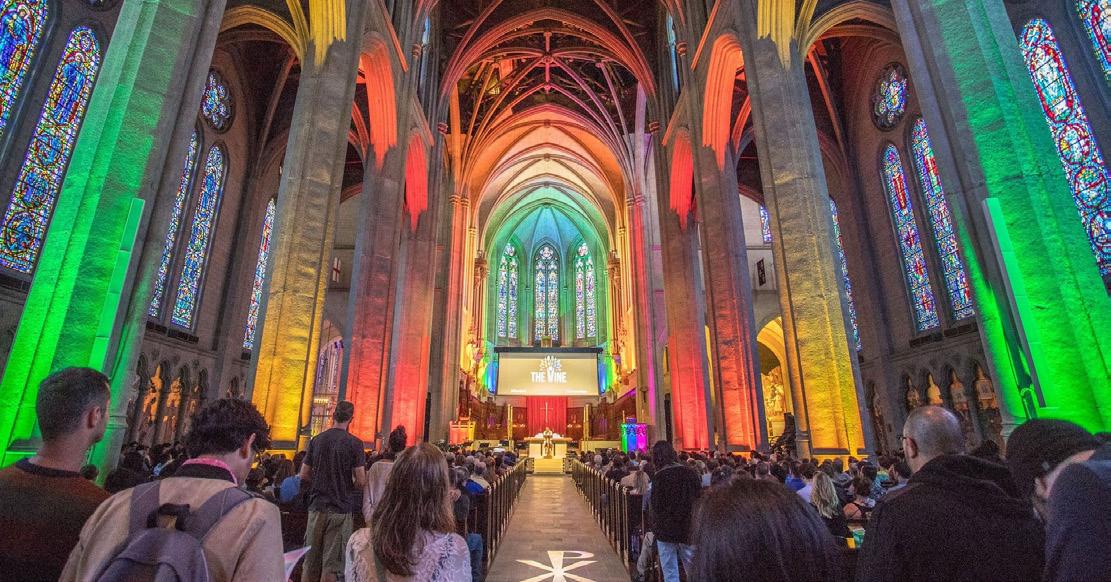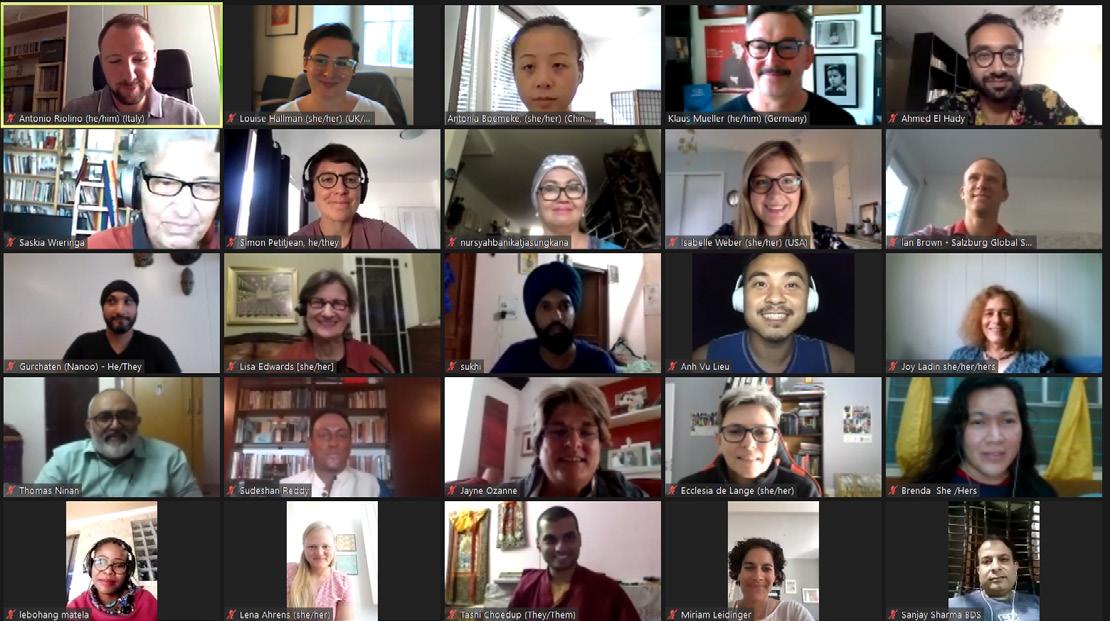
5 minute read
MOVING FORWARD WHERE DID WE START? WHAT DID WE LEARN? WHERE DO WE GO?
“The photo of a swinging bridge for me depicts a path into the unknown… Life is in constant movement which asks of us to move with it to bring harmony between one’s sexuality and spirituality,” explains Rev. Ecclesia de Lange in her blog I Lived in Denial of Who I Am and I Settled for a Life of Celibacy and Secrecy.
MOVING FORWARD
by Klaus Mueller, Founder and Chair, Salzburg Global LGBT* Forum
This year, the Salzburg Global LGBT* Forum started a new initiative on LGBT and Faith, convening human rights defenders, and cultural and religious leaders across faith communities, geographies, and generations.
Our weekly online blog series on LGBT* and Faith ran from early August to late November 2020. The series began an inclusive global conversation bringing together faith and LGBT communities. In our reports we share some of the outcomes, mindsets and themes of our online blogs and group discussions. These reports also benefit from the discussions that took place following each blog on Facebook and during our webinar.
WHERE DID WE START?
We started by stating the obvious: We all, to varying degrees, live in cultures and societies that were and are formed by religious traditions and expressions of faith. LGBT people are increasingly insisting on their inclusion in faith communities and cultural traditions. In response to these calls and actions, many religious congregations have begun to interpret their own beliefs in more inclusive ways.
Based on our work on securing fundamental human rights, Salzburg Global supports these emerging positive changes to advance LGBT equality globally and within faith communities.
Geographically, our program connected Fellows from 17 countries from Asia, Africa, South and North America, and Europe. Our webinar audience was even more diverse, coming from 23 countries.
Thematically, our Global Online Forum on LGBT and Faith brought together members and leaders of faith communities from within Judaism, Islam, Christianity, Hinduism, Buddhism and Sikhism, as well as agnostics, atheists, anthropologists, and cultural believers.
WHAT DID WE LEARN?
Listening to each other, we learn not only that, but how we live in cultures shaped by religion and faith.
Many Fellows shared with great honesty their personal journeys of faith; the obstacles and opportunities they have faced and are facing; their ideas for change; and whether they have experienced progress or backlash.
Listening to their life stories, we understood: Faith communities that are unresponsive to the needs of their LGBT members counteract their core values of love, inclusion, and community. The engagement by readers of these blogs in in the comments section reminded us of the shared experiences of exclusion and marginalization – but also of resilience and resistance.
The blog series has confirmed that reality: If we do not actively engage with faith communities as supporters and allies, it will be difficult to make long-term progress on LGBT equality.
We also hear: LGBT communities – emphasizing and valuing their diversity – are in a constant process to make space for all within their communities. But there can be friction when LGBT people of faith come out as such within LGBT communities. It is important to address this also. LGBT communities fight for the right to define one’s own gender identity; for marriage equality; for the right to have families. Supporting our sisters and brothers who strive for inclusion in their faith communities is an integral part of this call for equality.
“LGBT people have been, are and will be part of faith communities, and
people of faith have been, are and will be part of LGBT communities. We
are not strangers to each other.” Freedom of religion means that an individual or community has the freedom to worship and practice their religion, the freedom to change their religion, and the freedom to not practice a religion. Freedom of religion is a fundamental human right for all. And it cannot and should not be taken away because you are LGBT.
“Learning” would be my keyword of what happened over the last months, as well as a sense of global connection within the group of Fellows: unexpected synergies, new bridges, a growing understanding of joint themes and perspectives despite working in distinctively different environments.
When we started our Faith is…? initiative, in part we mentally still held on to an imagined separation of LGBT and faith communities as two communities in opposition to each other. Listening to our Fellows, it became obvious that this juxtaposition, however, is part of the problem. It does not do justice to the lived reality for many LGBT individuals around the world.

Rev. Brandan Robertson preached on the spiritual importance of coming out at the Sister Act Pride Mass at Grace Cathedral in San Francisco, CA in 2019 – a transformative moment he reflects on in his blog As a Christian Minister, I Believe That Queer People (and All People) Are Created in the Image of God.

Egyptian lesbian Sarah Hegazy died of suicide alone in exile in Canada. Her friend Ahmed El Hady remembers her in his blog I Would Love To See Many Members of the LGBT Community Revolting Against the Predominant Religious Discourse but Who Will Defend Them? Buddhist monastic Tashi Choedup shares their journey of forging a healthy relationship between their queerness and their faith in their blog My Faith Has Helped Me With My Queerness and My Queerness Helps Me in Making My Faith Inclusive.

In fact, this supposed opposition between LGBT and faith communities is often used by a globally connected movement towards more intolerance, misusing religion and the socalled “protection of the family” and pushing a strong anti-gender agenda.
WHERE DO WE GO?
Many of our Fellows urged society to rid itself of such long-held and deep polarization – otherwise the polarization will persist. Communities often describe themselves by defining who belongs (we) and who does not belong (them). But LGBT people grow up within their families and often are raised within faith communities. They are not coming “from the outside.”
We strongly believe that bringing together LGBT and faith leaders advances inclusive approaches and strengthens LGBT equality. As we embark on our second year of our Online Forum on LGBT and Faith, we thank our Fellows, partners and donors who have made this first step so successful. We will engage with them to look at our collaboration in 2021 and the direction we propose. We aim:
• to continue and extend our blog series thematically to grow as a new platform for a civil, open and joyful conversation on advancing inclusive approaches; • to make the work of our fellows more accessible through a variety of venues and media; • to engage in new partnerships with transnational and global initiatives, foundations and
NGOs working in this field and to share the vision our fellows are developing; and • to further deepen our collaboration with partners in faith and LGBT communities.




